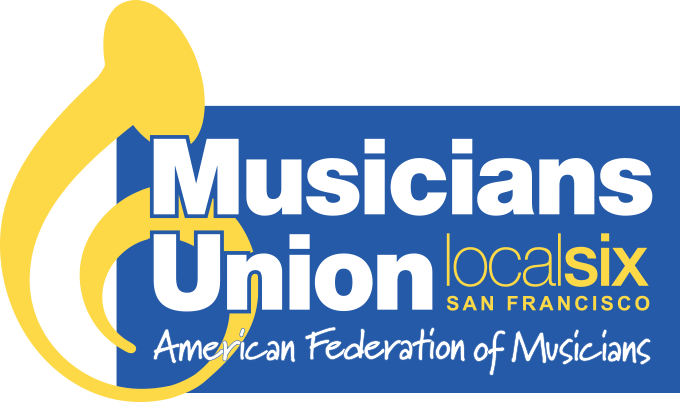by Alex Walsh
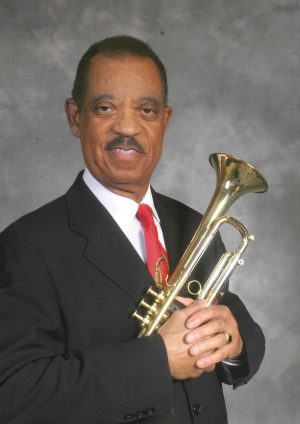 David Hardiman is a Trumpet player, Educator, Bandleader, Composer, Community Activist, and Local 6 Life Member.
David Hardiman is a Trumpet player, Educator, Bandleader, Composer, Community Activist, and Local 6 Life Member.
The youngest of four children, David Hardiman was born in Indianappolis, IN, in 1939. “My parents were not middle class or well to do. My dad always worked an extra job and my mother worked very hard raising us.” David started playing trumpet and piano in the 4th grade. “I used the school trumpet until I could afford my own. My mother played the piano by ear, so growing up
we had an upright in our house.”
In high school, David’s teachers recognized his talent and pushed him. David played in various concert bands, the marching band, and R.O.T.C. He was involved with a youth group, the Tempe Music Club, that his mother sponsored, and the Indianapolis Music Promoters, an organization that promoted African American youth. “The Music Promoters took me to New Orleans to play a classical concert. It was the first time I had ever been on a train. When I graduated, they gave me a $100 scholarship to go to Indiana University.”
Indiana University didn’t offer jazz classes and the professors actively discouraged it. David remembers being threatened with expulsion by the Dean who called him to his office over complaints that he and his friends were playing jazz in the East Hall. David says that whether he liked it or not, he had to graduate as a classical musician.
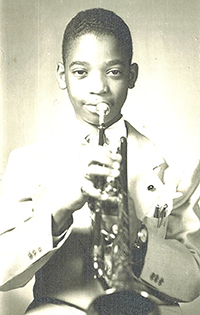
David at age 12.
David graduated in 1959 at the age of 20 and immediately started working as a substitute music teacher, until he landed a fulltime position. With his R.O.T.C. training, he says he could have gone into the army as a lieutenant, but his mother knew someone at the draft board so he wouldn’t have to serve. In 1960 he got married, and a couple years later his son, David Hardiman, Jr. was born.
For the next ten years David played in several Big Bands in Indianapolis, and various other music ensembles, but his main focus was teaching.
By 1971, David was ready for a change. He knew that if he was going to make a name for himself, he had to leave Indianapolis and go to either New York or LA. He says the choice was easy—he hated the terrible East Coast weather! When he couldn’t find any teaching work in LA, he was encouraged by his mentors and friends, including Dr. Willis Kirk, to move to the Bay Area. They were able to get him a job at Berkeley’s Martin Luther King Jr. High School.
“I was brought in as an affirmative action teacher and taught concert band and concert orchestra. I lived in Richmond and started going to jam sessions and began meeting people. There were only a few clubs in the East Bay, so I would go to an after-hours club in the Fillmore area in San Francisco. It wasn’t long before I started playing gigs.”
Wanting to move on from teaching Jr. High, David started teaching college in the East Bay and in 1974 followed Dr. Kirk to San Francisco City College. (Dr. Kirk became President of City College in the mid-80s. His profile is in the archive on the Local 6 website.) “I came in and took over the City College Big Band and a few years later established the Jazz Rock Improv Workshop for those who weren’t adept at reading. One of the good things about City College was the department would support my student concerts at the end of each semester. I was able to bring in some of the greatest jazz musicians in the world to perform with the school bands.”
Once David started teaching at City College of San Francisco, Dr. Willis Kirk began taking him to the International Association of Jazz Educators conferences. “They had a black caucus because the black musicians were not able to be a part of it in many situations, especially in the South. Jazz wasn’t taught in many schools at that time. Going to conferences, I met a lot of people from all over the country. I eventually directed the African American Jazz Caucus Big Band twice in Toronto, twice in New York, and once in Long Beach. When I retired in 2004 from teaching at City College of San Francisco after thirty years, my son, David Hardiman Jr., also a trumpet player and teacher, took over my classes.”
The San Francisco All-Star Big Band
David joined Local 6 in 1973 so he could play in the Golden Gate Park Band, which he did for 20 years. “I played in a few big bands when I got here, but I was like a token. They didn’t have very many black musicians performing with them.”
In 1975, big bands were going out of style, but David says he had something to prove. “I was trying to show everybody that black musicians could read and play and sound really good, because, with some of the black bands I played in, some of the musicians just really weren’t qualified.”
With a grant from the San Francisco Arts Commission, he established the San Francisco All-Star Big Band. “I called it that because we had musicians who played with Count Basie and Duke Ellington, and other legends. A lot of them have since passed on or moved away. We used to rehearse almost every Monday night. I was able to use the City College Band facilities, and Frank Fisher was writing for us. One memorable gig was we got to play behind Tony Bennett at the St. Francis Hotel. He sent me his charts and brought his piano conductor. That was big for my band.”
In 1978, the SF All-Star Big Band made an LP and in 2003 David released it on CD. Today, the SF All-Star Big Band is still going strong. “We had our 37th anniversary at Yoshi’s with Denise Perrier, Nina Causey, and Sweetie Mitchell singing. Last August we did an Ellington tribute at Yerba Buena Gardens in San Francisco, and the Sacramento Jazz Cooperative.”
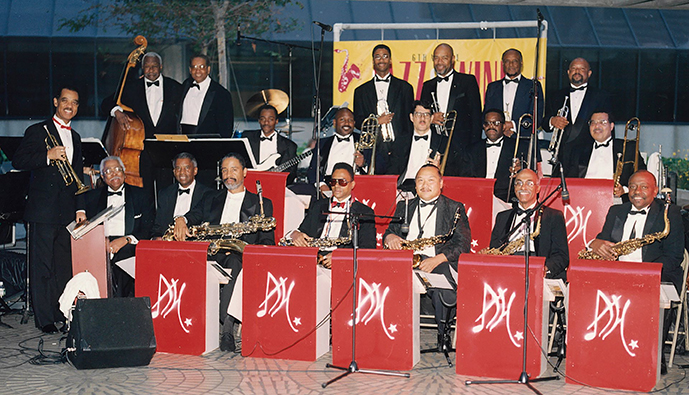
The San Francisco All-Star Big Band in the 2000s.
Over the years David also established various ensembles to play in hotels, for dances and parties. Because the Jazz scene was on the decline in the 70s, David connected with the burgeoning Salsa scene. He began playing with a Salsa band called The Aliens, which he still does today, along with other groups. “In the 70s and 80s, my weekends were full. I was playing Salsa most Friday and Saturday nights from 10pm-4am at Ceasar’s Latin Palace on Mission Street. Then I’d get up to make a 10am rehearsal for the Golden Gate Park Band and play a concert from 1-3pm, by Sunday night I was totally wiped out.”
In 1995, David began his career as a bugler at Bay Area horse racing tracks. “The Musicians Union sent me a letter saying that the position for the Bay Meadows race track was open and asked me if I wanted to come down and audition. I’d never been to the race track. I went down and played the Call To Post, it was easy. They said, ‘Ok, play it again.’ Then they said, ‘Ok, show up Friday.’ They suited me up on Friday night and I played Friday, Saturday, and Sunday.”
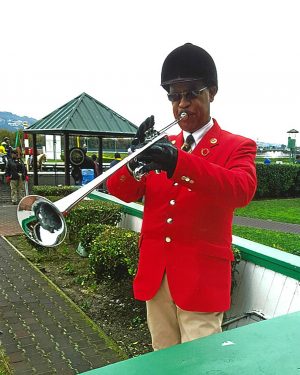
“At the racetrack I started by just playing ‘Call To Post’, and then I added other songs like the Star Wars and Rocky theme. My hook is Tequila, because it’s audience participation. They love it.”
When Bay Meadows closed in 2008, David continued to work for Golden Gate Fields, though it was a non-union job by this time. A few years later, management tried to let him go but there was a huge backlash. “One of the owners told me, ‘It’s tradition. We want a bugle.’ So, they brought me back.”
Over the years, David released several CDs of Jazz and World Music, and in 2017, he was given an honorary doctorate of the Arts and World Music from Martin University in Indianapolis.
Today, David keeps busy. In addition to the SF All-Star Big Band, he plays with 3 salsa bands and various smaller jazz ensembles. He serves on multiple committees and is active in the fight to revive the Fillmore Heritage Center, which he would like to see it turned into a school for the arts. “I’m busy, on purpose. I don’t know what else to do.”
